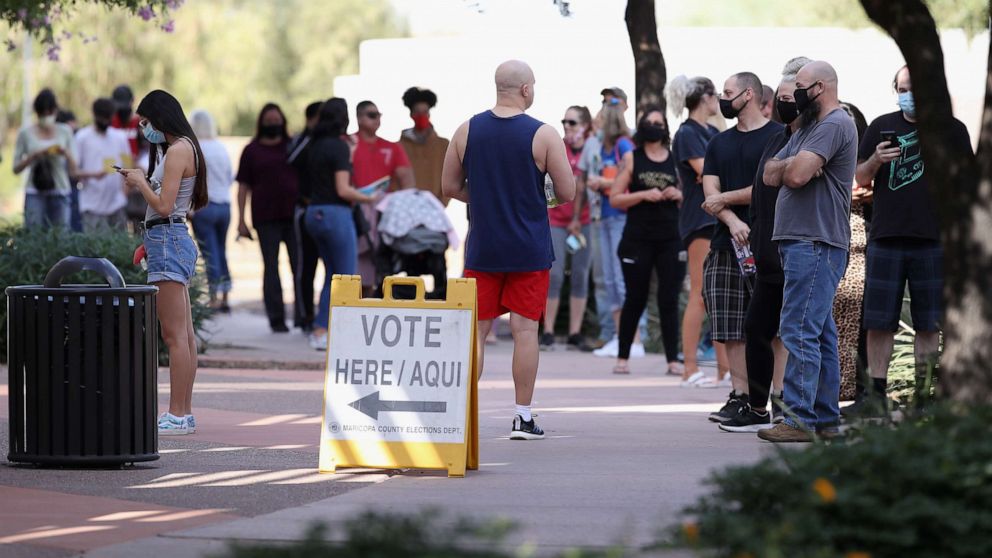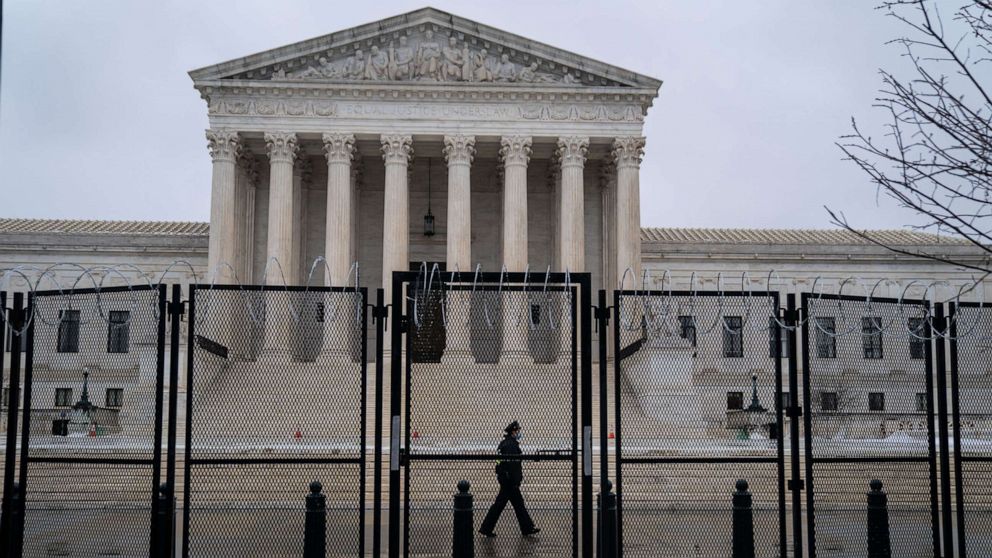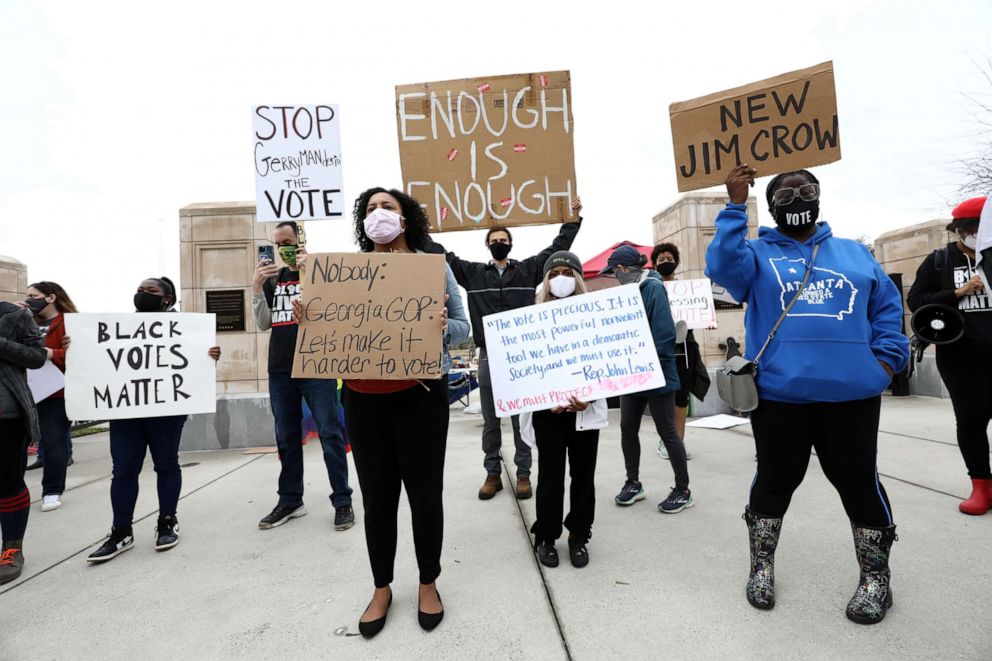美国最高法院周二首次就是否以及如何对一个1965年投票权法案的关键部分意味着战斗种族歧视庄严地选举法律。
在亚利桑那州以外的一个案件中,由于大流行,通过电话会议进行了口头辩论,法官们努力解决如何解释和执行该法案第2节,该节规定,任何“导致以种族或肤色为由剥夺或删减”投票权的措施都是非法的。
“语言很清楚。它关注的是政府行为的效果,而不是真空中的政府行为索尼娅·索托马约尔法官。“如果你没有投票权,你就被剥夺了一些东西,因为——或者导致你在国家可以轻易补救的情况下被拒绝。”

克里斯蒂安·彼得森/盖蒂图像,文件
2020年11月3日,亚利桑那州惊喜区,选民们在惊喜法院投票站排队等候。
正义布雷特·卡瓦诺建议看效果的州投票法光有是不够的。
卡瓦诺说:“我们处于纯粹的结果(投票法)和纯粹的机会(投票)之间。”。“当一个州的规则在其他州司空见惯时,这似乎是一种有利于州规则合法性的情况,而不是歧视意图的反映。”
本案的核心是亚利桑那州限制投票方式的两项法律。一个州取消了选区外投票的资格,另一个州禁止第三方收集邮寄给州官员的选票。
法院必须决定法院应该使用什么样的测试来确定这些法律以及根据第2节受到质疑的其他法律是否具有种族歧视性。经过近两个小时的争论,法官们似乎没有找到明确的答案。
“如果一个州主动向白人居民区而不是黑人居民区发送选票申请,这将导致后者参与的机会减少。”艾米·科尼·巴雷特法官说着,提出了一个假设。“减少机会就是减少法规文本中的机会,即使黑人选民还有其他途径可以选择。”

肯特西村/洛杉矶时报通过盖蒂图像,文件
2021年2月22日,华盛顿特区,美国最高法院周围的铁丝网围栏
就在他们就执行第2条的标准进行辩论的时候,法院的保守派似乎倾向于支持有争议的亚利桑那州法律的实质,甚至拜登政府已经承认可能不会与VRA冲突。
州共和党官员坚称,这些措施不分种族,旨在防止欺诈。民主党人认为,这些措施对全州的印第安人、拉丁美洲人和黑人选民产生了不成比例的影响。
“总的来说,穷人和受教育程度较低的人可能会发现,与那些更富裕、受教育程度更高的人相比,遵守几乎每项投票规则更难,”塞缪尔·阿利托法官说。他建议,废除这些法律的举措可能会为“每项投票规则”的攻击浪潮打开大门。
联邦地区法院和第九巡回上诉法院的三名法官组成的陪审团认为这些法律没有违反第二条。但是整个第九巡回法院进行了更全面的听证,推翻了这一决定,并表示他们在意图和结果上都是歧视性的。
首席大法官约翰·罗伯茨长期以来一直批评《投票权法案》的部分内容,他提到了2005年由前民主党总统吉米·卡特和共和党国务卿詹姆斯·贝克领导的联邦选举改革委员会,该委员会发现选票收集存在欺诈的时机已经成熟。
“你的立场是,如果没有种族相称性,那么法律应该被废除,”罗伯茨向一名质疑亚利桑那州法规的律师施压,“但我问你,这是否意味着你必须容忍贝克-卡特委员会报告中概述的问题?”
据州官员称,2020年,大约80%的亚利桑那州人通过邮件或投币箱提前投票。许多农村少数民族社区历来依靠第三方志愿者集体收集和提交选票。没有证据表明这种做法被滥用了。
斯蒂芬·布雷耶法官试图在整个听证会期间将双方聚集在一起,提出了一个评估投票法中潜在种族歧视的综合框架。
“首先,原告必须证明存在某种明显的差异;第二,原告必须证明至少有正当理由...然后,第三,被告可以回来表明,嗯,我们有一个很好的非种族相关的原因,这是不容易实现的其他方式,”布雷尔说。“这将总是一个个案例,它将总是涉及所有的情况,但这是三个关键因素。”

达斯汀·钱伯斯/路透社
2021年3月1日,抗议者聚集在亚特兰大佐治亚州议会大厦外,抗议HB 531,该法案将对佐治亚...
法院设定的标准将决定投票权倡导者挑战即将到来的新限制浪潮的难度。
追踪这一趋势的无党派选民倡导组织布伦南正义中心(Brennan Center for Justice)表示,至少43个州的州议员正在考虑超过250项法案,这将使投票更加困难。
许多措施的目标是提前投票,这在2020年大受欢迎,并导致了历史性的投票。由于流感大流行,30个州通过邮件投票变得更加容易,但现在至少有24个州正在考虑在未来的选举中减少投票。
法院将在6月底之前做出判决。
Supreme Court wrestles with voting rights and race discrimination
The U.S. Supreme Court wrestled Tuesday with whether and how to impose limits for the first time on akey part of the Voting Rights Act of 1965meant to combatracial discriminationin stateelectionlaws.
During oral arguments in a case out of Arizona, conducted via teleconference because of the pandemic, the justices grappled with how to interpret and enforce Section 2 of the act, which says any measure which "results in a denial or abridgment" of voting rights "on account of race or color" is illegal.
"The language is very clear. It focuses on the effects of government action, not government action in a vacuum," saidJustice Sonia Sotomayor. "You're denied something if you're not given the right to vote because -- or results in your denial from circumstances the state could remedy easily."
JusticeBrett Kavanaughsuggested thatlooking at the effectsof astate voting lawalone wouldn't suffice.
"We're between pure results (of a voting law) and pure opportunity (to vote)," Kavanaugh said. "When a state rule is commonplace in other states, that seems to be a circumstance that puts a thumb on the scale in the favor of the legitimacy of the state rule and it not being a reflection of discriminatory intent."
At the heart of the case are two Arizona laws that limit how ballots are cast. One disqualifies ballots cast out-of-precinct and another prohibits third-party collection of mail ballots for delivery to state officials.
The court must decide what test courts should use to determine whether those laws, and others challenged under Section 2, are racially discriminatory. The justices did not seem to find a clear answer over nearly two hours of arguments.
"If a state sends unsolicited ballot applications to white neighborhoods but not to residents of Black neighborhoods, that would result in giving the latter less opportunity to participate,"Justice Amy Coney Barrettsaid, raising a hypothetical. "Reducing an opportunity is reducing an opportunity in the text of the statute even if there's still other avenues open to the Black voters."
Even as they debated a standard for enforcing Section 2, the court's conservatives seemed inclined to uphold the substance of the contested Arizona laws, which even theBiden administration has concededmay not have run afoul of the VRA.
State Republican officials insist the measures are race-neutral and intended to prevent fraud. Democrats argue the measures disproportionately impact Native American, Latino and Black voters across the state.
"People who are poor and less well educated on balance probably will find it more difficult to comply with just about every voting rule than do people who are more affluent and had benefit of more education," said Justice Samuel Alito, suggesting a move to strike down the laws could open the door to a tidal wave of attacks on "every voting rule."
A federal district court and three-judge panel on the Ninth Circuit Court of appeals found that the laws did not violate Section 2. But a fuller hearing by the entire ninth circuit reversed the decision and said they were discriminatory both in intent and result.
Chief Justice John Roberts, a longtime critic of parts of the Voting Rights Act, referenced a 2005 commission on federal election reform led by former Democratic President Jimmy Carter and Republican Secretary of State James Baker which found that ballot collection was ripe for fraud.
"Your position is that if there isn't racial proportionality then the law should be struck down," Roberts pressed to an attorney challenging the Arizona statutes, "but I'm asking you if that means you have to tolerate the problems outlined in the Baker-Carter commission report?"
Roughly 80% of Arizonans voted early by mail or drop-box in 2020, according to state officials. Many in rural, minority communities have historically relied on third-party volunteers to collect and submit ballots in groups. There has been no evidence the practice has been abused.
Justice Stephen Breyer attempted to bring the sides together throughout the hearing, proposing a comprehensive framework for evaluating potential racial discrimination in voting laws.
"First, a plaintiff has to show that there is some kind of significant disparity; second, the plaintiff has to show that there is at least but-for cause ... and then, third, the defendant can come back and show, well, we have a good non-race-related reason for this and it can't be accomplished easily in other ways," Breyer said. "It will always case by case, it will always involve all the circumstances, but those are the three key elements."
The standard the court sets will determine how difficult it will be for voting rights advocates to challenge a tidal wave of new restrictions on the horizon.
State legislators in at least 43 states are considering more than 250 bills that would make it harder to vote, according to the Brennan Center for Justice, a nonpartisan voter advocacy group tracking the trend.
Many of the measures target early voting, which exploded in popularity during 2020 and led to historic turnout. Thirty states made it easier to vote by mail because of the pandemic, but now at least 24 states are considering measures to scale it back in future elections.
The court will hand down a decision by the end of June.






